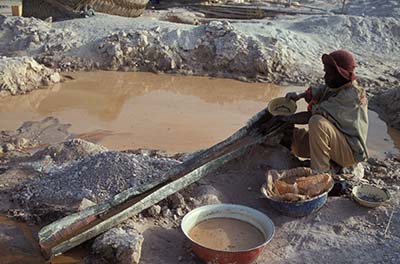Improving Access to Water in Chad’s Cities

Key Contact
Miguel Vargas-Ramirez
Start Date
End Date
Funding Amount
$ 37,977
Knowledge-providing Countries
Knowledge-receiving Countries
Summary
The Government of Chad prioritized increasing water services in urban areas, with a target of 74 percent of households having access to an “improved water source” as per the Millennium Development Goals (MDGs). In 2010, the Government overhauled the water sector, dissolving the national water and electricity company and establishing a new water utility (Societe Tchadienne des Eaux - STE). In the context of this reform and Additional Financing for the World Bank Chad Projet d'Appui au Developpement Urbain (PADUR), the STE sought to increase private sector involvement in urban water services. However, STE and PADUR staff lacked confidence to engage the private sector, and the know-how and skills to design contracts and process and evaluate bidding documents. They also lacked capacity to manage human resources, communicate with clients, and scale-up services.
With financing from the South-South Facility, three STE staff members, three officials from the Ministry of Rural and Urban Hydraulics, and four officials from the PADUR traveled to Burkina Faso in October 2011 to meet with counterparts from the Burkina Water Utility (ONEA), which had experience engaging the private sector while facing similar legal and sector challenges. During this visit, delegates learned about ONEA’s role, its models for contracting with the private sector, human resource and communication strategies, and policies and programs to expand services. With cost savings from the South-South Facility grant, experts from Burkina Faso traveled to Chad in August 2012 to help refine and tailor a Terms of Reference (ToR) for a private contractor and evaluate bids. These exchanges led to the creation of a long-term “twinning” partnership between these two utilities to sustain learning.
Through these exchanges, STE and PADUR staff became more confident in contracting with the private sector. Delegates’ support for the chosen service contract model was strengthened, and they learned that they could engage the private sector while maintaining public control over assets and service provision. Delegates also improved their ability to undertake bidding procedures and evaluate contractors, communicate with clients, and expand water services. One Chadian delegate noted, “the study tour was enriching for STE and the administration of Chad’s water sector” and “the choice to visit ONEA before launching activities allowed us to start from a good base.”
In June 2013, the STE successfully engaged a private operator (AQUATECH International) to help achieve important milestones, such as extending water networks, metering water consumption, and enhancing a customer database and monitoring system.
Beneficiaries / Participants
The Government of Chad wanted to increase water services in urban areas as well as the share of Chadian households with access to an “improved water source” from 67% to a 74%, which is a key target derived from the Millennium Development Goals (MDGs). To make progress on this front, Chadian officials dissolved the national water and electricity company and established a new water utility (Societe Tchadienne des Eaux - STE). The government expected this utility to deliver water services more efficiently in urban areas and to support private sector involvement in service delivery. However, STE staff members were not familiar with contract models and lacked confidence in contracting with the private sector. They did not have the know-how and skills to design contracts, issue bidding documents, undertake bidding evaluations, and manage contracts.
In May 2011 the World Bank approved Additional Financing for the Chad Urban Development Project (Projet d’Appui au Développement Urbain (PADUR)) to continue scaling-up urban water supply services and to support STE in contracting with the private sector. To build the capacity of the STE to implement the PADUR, the World Bank proposed that STE staff and Chadian officials learn from the experience of the Burkina Faso water utility (ONEA) in leveraging the private sector, since it operated under legal and sector contexts similar to Chad’s. The resulting exchange included a visit to ONEA in Burkina Faso, a visit of Burkinabe experts to Chad, and the signing of a longer-term learning partnership to foster the STE’sprivate sector engagement, build its capacity to provide water services, and strengthen its client communication and engagement.
Moving forward
Capitalizing on learning from the exchange, the STE successfully engaged a private operator (AQUATECH International) in June 2013 to help STE achieve 11 key milestones, ranging from extending water networks to metering water consumption to enhancing a customer database and monitoring system.
The STE also engaged the Ministry of Hydraulics and the Ministry of Urban Development (under which PADUR is located) to develop an open and fluid relationship for implementing donor projects in the water sector.
The exchange stimulated other international learning opportunities. For example, the STE has become an active participant in international forums for water operators, such as the 16th African Water Association Congress in Marrakech in February 2012 and the World Water Forum in Marseille in September 2012. The UN-Habitat, the Agence Française de Développement (AFD), and the World Bank are also exploring supporting a Water Operators Exchange (WOP) between these two utilities.

 China
China Colombia
Colombia Denmark
Denmark India
India Indonesia
Indonesia Mexico
Mexico Russian Federation
Russian Federation Spain
Spain United Kingdom
United Kingdom